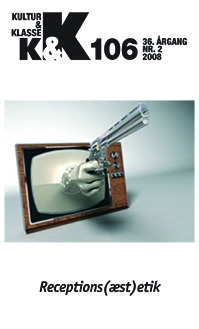Dokumentarfilmens etik: Mellem Den Hemmelige Krig med det hemmelige plot og Michael Moores satiriske dokumentarmassakre
DOI:
https://doi.org/10.7146/kok.v36i106.22028Nøgleord:
Dokumentarfilm, etik, Krig, hemmelig, plot, Michael Moores, satiriske, dokumentarmassakreResumé
Ethics of Documentary Films: In Between the Secret Plot of Den Hemmelige Krig and Satirical Documentary- massacre by Michael Moore:
In this article I focus on ethics, and the way it is usually interpreted in the context of documentary television – that is normative and aimed at creators. This way of thinking is illustrated in my setting out of Jan Foght Mikkelsen’s contribution to ethics of mediation, and in that respect I argue that the request for ethical sensitivity among creators of mass-mediated communication must be complemented with an offer of a recipient-oriented vocabulary. Audiovisual mass communication represents an asymmetric display of force between creator and recipient, and Mikkelsen’s ethics of mediation claims its purpose to be a protection of autonomy among media consumers. Thus my suggestion is to supplement the ethics of mediation by addressing the audience of the communication in an attempt to rectify the imbalance of forces.
In my analysis of Christoffer Guldbrandsen´s documentary Den Hemmelige Krig I focus on how the narrative seeks to persuade its audience through narrative strategies and cinematic devices, and I thereby abstain from any kind of substantial evaluation of communication. Based on analytical impacts and some interpretations of this passage, I point out the importance of the nuanced attention to small details in classical authoritative documentaries.
The main conclusion is that we need to develop a new vocabulary, which can provide media consumers with an approach to audiovisual documentaries making them aware of communicative aspects.
Downloads
Publiceret
Citation/Eksport
Nummer
Sektion
Licens
Tidsskriftet følger dansk ophavsret.


